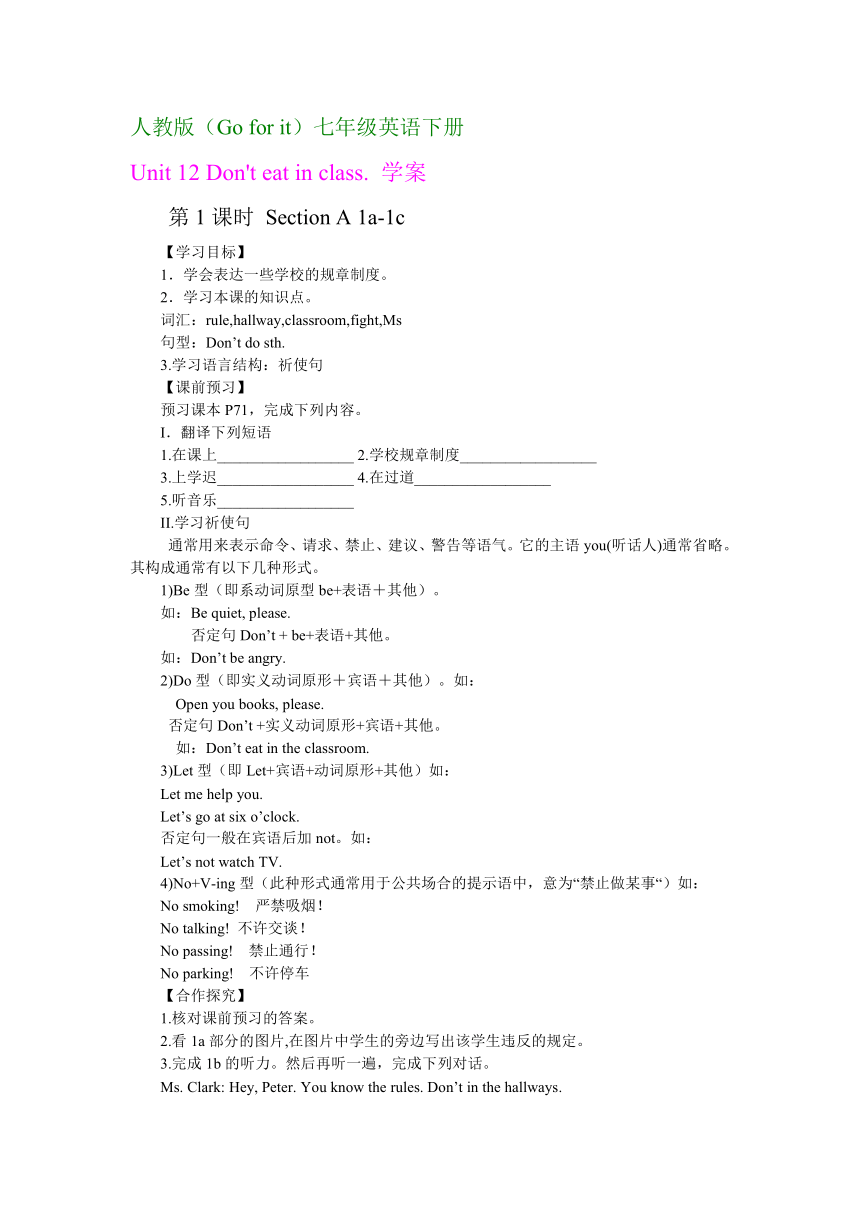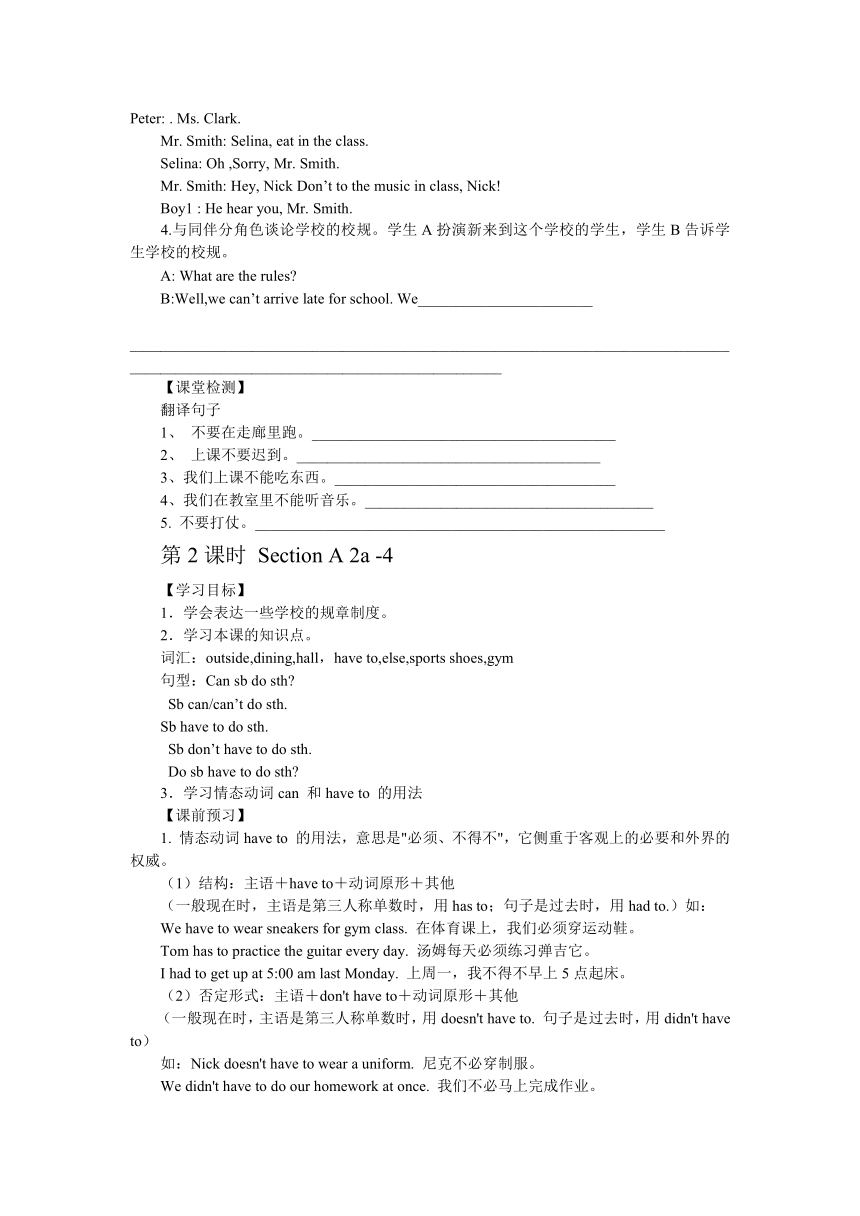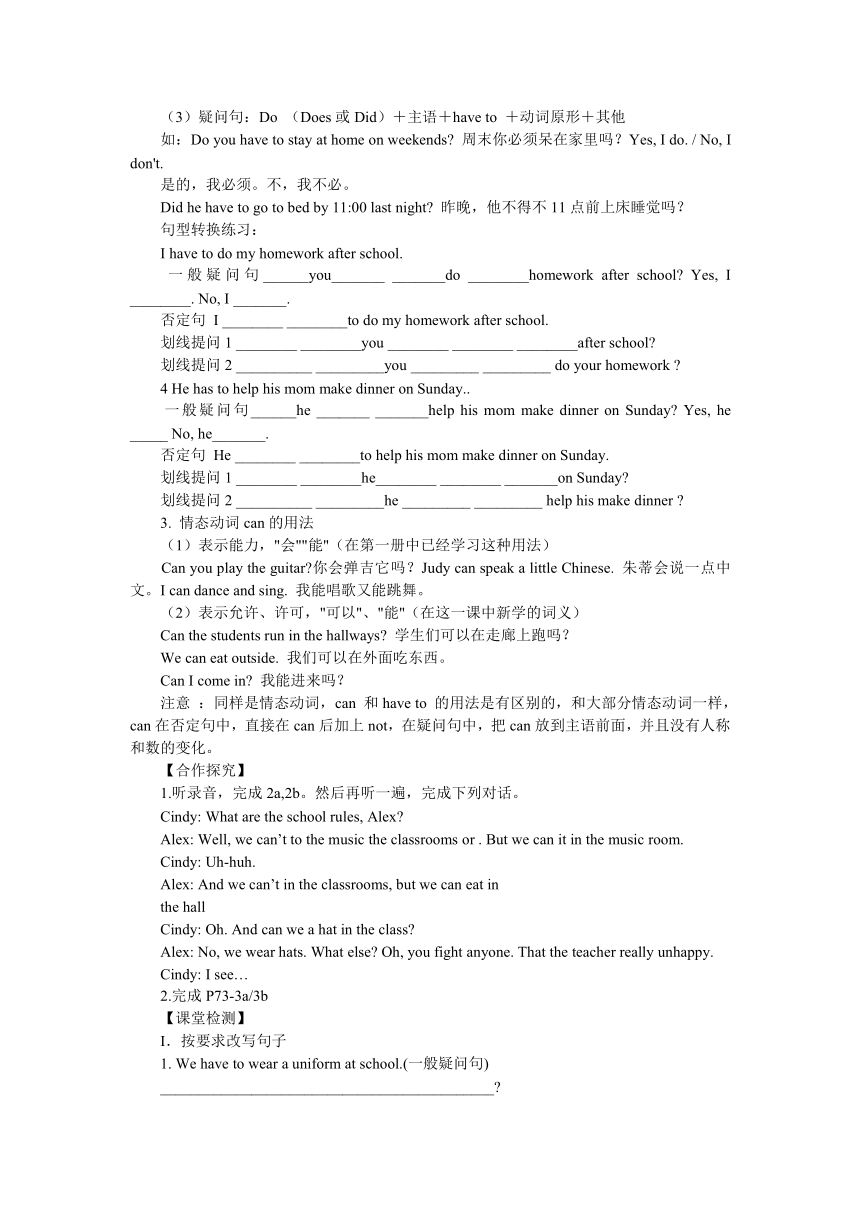Unit 12 Don’t eat in class. (4课时学案)
文档属性
| 名称 | Unit 12 Don’t eat in class. (4课时学案) |

|
|
| 格式 | zip | ||
| 文件大小 | 16.1KB | ||
| 资源类型 | 教案 | ||
| 版本资源 | 人教新目标(Go for it)版 | ||
| 科目 | 英语 | ||
| 更新时间 | 2012-05-19 19:55:36 | ||
图片预览



文档简介
人教版(Go for it)七年级英语下册
Unit 12 Don't eat in class. 学案
第1课时 Section A 1a-1c
【学习目标】
1.学会表达一些学校的规章制度。
2.学习本课的知识点。
词汇:rule,hallway,classroom,fight,Ms
句型:Don’t do sth.
3.学习语言结构:祈使句
【课前预习】
预习课本P71,完成下列内容。
I.翻译下列短语
1.在课上__________________ 2.学校规章制度__________________
3.上学迟__________________ 4.在过道__________________
5.听音乐__________________
II.学习祈使句
通常用来表示命令、请求、禁止、建议、警告等语气。它的主语you(听话人)通常省略。其构成通常有以下几种形式。
1)Be型(即系动词原型be+表语+其他)。
如:Be quiet, please.
否定句Don’t + be+表语+其他。
如:Don’t be angry.
2)Do型(即实义动词原形+宾语+其他)。如:
Open you books, please.
否定句Don’t +实义动词原形+宾语+其他。
如:Don’t eat in the classroom.
3)Let型(即Let+宾语+动词原形+其他)如:
Let me help you.
Let’s go at six o’clock.
否定句一般在宾语后加not。如:
Let’s not watch TV.
4)No+V-ing型(此种形式通常用于公共场合的提示语中,意为“禁止做某事“)如:
No smoking! 严禁吸烟!
No talking! 不许交谈!
No passing! 禁止通行!
No parking! 不许停车
【合作探究】
1.核对课前预习的答案。
2.看1a部分的图片,在图片中学生的旁边写出该学生违反的规定。
3.完成1b的听力。然后再听一遍,完成下列对话。
Ms. Clark: Hey, Peter. You know the rules. Don’t in the hallways.
Peter: . Ms. Clark.
Mr. Smith: Selina, eat in the class.
Selina: Oh ,Sorry, Mr. Smith.
Mr. Smith: Hey, Nick Don’t to the music in class, Nick!
Boy1 : He hear you, Mr. Smith.
4.与同伴分角色谈论学校的校规。学生A扮演新来到这个学校的学生,学生B告诉学生学校的校规。
A: What are the rules
B:Well,we can’t arrive late for school. We_______________________
________________________________________________________________________________________________________________________________
【课堂检测】
翻译句子
1、 不要在走廊里跑。________________________________________
2、 上课不要迟到。________________________________________
3、我们上课不能吃东西。_____________________________________
4、我们在教室里不能听音乐。______________________________________
5. 不要打仗。______________________________________________________
第2课时 Section A 2a -4
【学习目标】
1.学会表达一些学校的规章制度。
2.学习本课的知识点。
词汇:outside,dining,hall,have to,else,sports shoes,gym
句型:Can sb do sth
Sb can/can’t do sth.
Sb have to do sth.
Sb don’t have to do sth.
Do sb have to do sth
3.学习情态动词can 和have to 的用法
【课前预习】
1. 情态动词have to 的用法,意思是"必须、不得不",它侧重于客观上的必要和外界的权威。
(1)结构:主语+have to+动词原形+其他
(一般现在时,主语是第三人称单数时,用has to;句子是过去时,用had to.)如:
We have to wear sneakers for gym class. 在体育课上,我们必须穿运动鞋。
Tom has to practice the guitar every day. 汤姆每天必须练习弹吉它。
I had to get up at 5:00 am last Monday. 上周一,我不得不早上5点起床。
(2)否定形式:主语+don't have to+动词原形+其他
(一般现在时,主语是第三人称单数时,用doesn't have to. 句子是过去时,用didn't have to)
如:Nick doesn't have to wear a uniform. 尼克不必穿制服。
We didn't have to do our homework at once. 我们不必马上完成作业。
(3)疑问句:Do (Does或Did)+主语+have to +动词原形+其他
如:Do you have to stay at home on weekends 周末你必须呆在家里吗?Yes, I do. / No, I don't.
是的,我必须。不,我不必。
Did he have to go to bed by 11:00 last night 昨晚,他不得不11点前上床睡觉吗?
句型转换练习:
I have to do my homework after school.
一般疑问句______you_______ _______do ________homework after school Yes, I ________. No, I _______.
否定句 I ________ ________to do my homework after school.
划线提问1 ________ ________you ________ ________ ________after school
划线提问2 __________ _________you _________ _________ do your homework
4 He has to help his mom make dinner on Sunday..
一般疑问句______he _______ _______help his mom make dinner on Sunday Yes, he _____ No, he_______.
否定句 He ________ ________to help his mom make dinner on Sunday.
划线提问1 ________ ________he________ ________ _______on Sunday
划线提问2 __________ _________he _________ _________ help his make dinner
3. 情态动词can的用法
(1)表示能力,"会""能"(在第一册中已经学习这种用法)
Can you play the guitar 你会弹吉它吗?Judy can speak a little Chinese. 朱蒂会说一点中文。I can dance and sing. 我能唱歌又能跳舞。
(2)表示允许、许可,"可以"、"能"(在这一课中新学的词义)
Can the students run in the hallways 学生们可以在走廊上跑吗?
We can eat outside. 我们可以在外面吃东西。
Can I come in 我能进来吗?
注意 :同样是情态动词,can 和have to 的用法是有区别的,和大部分情态动词一样,can在否定句中,直接在can后加上not,在疑问句中,把can放到主语前面,并且没有人称和数的变化。
【合作探究】
1.听录音,完成2a,2b。然后再听一遍,完成下列对话。
Cindy: What are the school rules, Alex
Alex: Well, we can’t to the music the classrooms or . But we can it in the music room.
Cindy: Uh-huh.
Alex: And we can’t in the classrooms, but we can eat in
the hall
Cindy: Oh. And can we a hat in the class
Alex: No, we wear hats. What else Oh, you fight anyone. That the teacher really unhappy.
Cindy: I see…
2.完成P73-3a/3b
【课堂检测】
I.按要求改写句子
1. We have to wear a uniform at school.(一般疑问句)
____________________________________________
2. We have to clean the classroom.(对划线部分提问)
______________________________________________
3. We can eat in the cafeteria.(用in the classroom改为否定句)
____________________________________________
4. We can eat in the dinning hall. (一般疑问句)
___________________________________________
5. We can eat in the cafeteria. We can't eat in the classroom.(用but 将两句话连接起来)
__________________________________________________________
II.完成句子。
1.体育课你必须穿运动鞋。
You _________ ________wear_______ ________ ________gym class.
2.你必须在校穿校服吗?是的。/不必。
______you ______ ______wear a ______ _______at school
Yes, I _______.No, I _________.
3,在你学校里有什么规定?________ are the________ ________your school
4.你还必须做什么? ________ _______do you ______ ______ ______
第3课时Section B 1a-2C
【学习目标】
1. 学会表达一些家庭的规定。
2.进一步学习情态动词can, can’t与have to的用法。
3.掌握句型:Don’t watch TV after school.
Don’t go out on school nights.
Do your homework after school.
I have to do my homework after school. And I…
【合作探究】
1. 完成活动1-2b.
2. 再听一遍2b,完成下列对话。
Dave: Can you the movies tonight, Emily
Emily: No, I can’t. I out on school nights.
Dave: Oh, that’s too bad. I can go , but I have to be home ten.
Emily: You’re lucky. I have so rules…
Dave: Like what
Emily: I can’t hang out with my friends school.
Dave: Really
Emily: Yeah, I have my homework after school.
Dave: Oh, I do, too. And I have to my guitar every day.
Emily: Well, I have to my room every weekend.
Dave: Ugh.
Emily: And I can’t TV after school.
Dave: I can’t, either.
3.完成P75-3b
【课堂检测】
完成句子
1.每天练习你的吉它!____________your guitar every day.
2.不要在上学的晚上外出!________ ________ _________ ________school nights.
3.放学后做作业。_________________________________________
4.放学后不要看电视。_____________________________________
第4课时Section B 3a-3c and Self check
【学习目标】
1.学会表达一些家庭的规定。
2.相互了解各自的家规。
3.学习本课的知识点。
词汇:Dr, by, wash,later,the Children’s Palace,no talking,loudly
句型:I have too many rules.
I have to get up at six o’clock every morning.
I have to do my homework.
I have to clean my room and wash my clothes.
【课前预习】
阅读P75-3a,完成句子
1. 我不能放学后约朋友。I _______ ________friends________ __________.
2.我必须10点之前睡觉I _______ ________ _______in bed_______10 o’clock.
3.我不得不帮妈妈做饭。I ______ _______help mom_______ ______.
4.我必须去少年宫学钢琴。I ______ ______go to______ _______ _______ ______learn the piano.
5.我从来没有玩得高兴。 I _______ ________any __________.
【合作探究】
1.集体核对课前预习的答案。
2.阅读3a部分的短文,然后找出赵培的家规。
3.列出自己的家规,并询问自己的同学是否有同样的家规。
My Family Rules
____________________________________________________________________________________________________________________________________________________________________________________________________________________________________________________________________________________________________________________________
4. 完成P76-3
____________________________________________________________________________________________________________________________________________________________________________________________________________________________________________________________________________________________________________________________
【课堂检测】
I.选词填空,必要时要进行适当的变化。
have fun. arrive, learn, get to, listen to, hear,
1. Don’t________ late for class, or you will stand outside.
2. I usually _________class late, and my teacher is angry with me.
3. On weekends, he goes to the Children’s Palace ___________the painting.
4. Don’t___________ music in class, or you can’t __________your teacher clearly.
5. I have to do many things on weekends and I never_______ any________.
II.单项选择
1. She doesn’t _____ wear a uniform. She can wear a shirt.
A. have to B. has to C. / D. have
2. Don’t listen to music____ class.
A. in B. on C. in the D. for
3. She has ______ rules in her house.
A. too much B. much too C. too many D. lot of
4. Mike____to school very early every day.
A. arrives B. gets C. reaches D. arrive
5. His sister is ill ____for two days.
A. in the bed B. in bed C. on the bed D. on bed
6. A kid____ breakfast every morning, because it’s good for his health.
A. have to B. has to C. has to have D. has to has
7. You can watch TV_________school nights.
A. in B. on C. to D. by
8.-- Do you want _______ –No, thanks.
A. else anything B. anything else C. something else D. else something
9.On weekends I go to my grandparents’ home _______them do the cleaning.
A. help B. to help C. helped D. helping
10. It’s raining all day, so I ______stay at home.
A. must B. have to C. must to D. can
11.Be sure to get home____________9 o’clock on Sunday.
A. in B. on C. to D. by
12. I have ________homework to do today.
A. too many B. too much C. much too D. very
13. Don’t talk _______in the reading room. (阅览室)
A. loud B. loudly C. low D. lowly
14. –Can you swim --_______. And I’m good at it.
A. No, I can. B. Yes, I can’t. C. Yes, I can. D. No, I can’t.
15. She practices _____ English_____.
A. speaking, everyday B. to speak, every day
C. saying, everyday D. speaking, every day
Unit 12 Don't eat in class. 学案
第1课时 Section A 1a-1c
【学习目标】
1.学会表达一些学校的规章制度。
2.学习本课的知识点。
词汇:rule,hallway,classroom,fight,Ms
句型:Don’t do sth.
3.学习语言结构:祈使句
【课前预习】
预习课本P71,完成下列内容。
I.翻译下列短语
1.在课上__________________ 2.学校规章制度__________________
3.上学迟__________________ 4.在过道__________________
5.听音乐__________________
II.学习祈使句
通常用来表示命令、请求、禁止、建议、警告等语气。它的主语you(听话人)通常省略。其构成通常有以下几种形式。
1)Be型(即系动词原型be+表语+其他)。
如:Be quiet, please.
否定句Don’t + be+表语+其他。
如:Don’t be angry.
2)Do型(即实义动词原形+宾语+其他)。如:
Open you books, please.
否定句Don’t +实义动词原形+宾语+其他。
如:Don’t eat in the classroom.
3)Let型(即Let+宾语+动词原形+其他)如:
Let me help you.
Let’s go at six o’clock.
否定句一般在宾语后加not。如:
Let’s not watch TV.
4)No+V-ing型(此种形式通常用于公共场合的提示语中,意为“禁止做某事“)如:
No smoking! 严禁吸烟!
No talking! 不许交谈!
No passing! 禁止通行!
No parking! 不许停车
【合作探究】
1.核对课前预习的答案。
2.看1a部分的图片,在图片中学生的旁边写出该学生违反的规定。
3.完成1b的听力。然后再听一遍,完成下列对话。
Ms. Clark: Hey, Peter. You know the rules. Don’t in the hallways.
Peter: . Ms. Clark.
Mr. Smith: Selina, eat in the class.
Selina: Oh ,Sorry, Mr. Smith.
Mr. Smith: Hey, Nick Don’t to the music in class, Nick!
Boy1 : He hear you, Mr. Smith.
4.与同伴分角色谈论学校的校规。学生A扮演新来到这个学校的学生,学生B告诉学生学校的校规。
A: What are the rules
B:Well,we can’t arrive late for school. We_______________________
________________________________________________________________________________________________________________________________
【课堂检测】
翻译句子
1、 不要在走廊里跑。________________________________________
2、 上课不要迟到。________________________________________
3、我们上课不能吃东西。_____________________________________
4、我们在教室里不能听音乐。______________________________________
5. 不要打仗。______________________________________________________
第2课时 Section A 2a -4
【学习目标】
1.学会表达一些学校的规章制度。
2.学习本课的知识点。
词汇:outside,dining,hall,have to,else,sports shoes,gym
句型:Can sb do sth
Sb can/can’t do sth.
Sb have to do sth.
Sb don’t have to do sth.
Do sb have to do sth
3.学习情态动词can 和have to 的用法
【课前预习】
1. 情态动词have to 的用法,意思是"必须、不得不",它侧重于客观上的必要和外界的权威。
(1)结构:主语+have to+动词原形+其他
(一般现在时,主语是第三人称单数时,用has to;句子是过去时,用had to.)如:
We have to wear sneakers for gym class. 在体育课上,我们必须穿运动鞋。
Tom has to practice the guitar every day. 汤姆每天必须练习弹吉它。
I had to get up at 5:00 am last Monday. 上周一,我不得不早上5点起床。
(2)否定形式:主语+don't have to+动词原形+其他
(一般现在时,主语是第三人称单数时,用doesn't have to. 句子是过去时,用didn't have to)
如:Nick doesn't have to wear a uniform. 尼克不必穿制服。
We didn't have to do our homework at once. 我们不必马上完成作业。
(3)疑问句:Do (Does或Did)+主语+have to +动词原形+其他
如:Do you have to stay at home on weekends 周末你必须呆在家里吗?Yes, I do. / No, I don't.
是的,我必须。不,我不必。
Did he have to go to bed by 11:00 last night 昨晚,他不得不11点前上床睡觉吗?
句型转换练习:
I have to do my homework after school.
一般疑问句______you_______ _______do ________homework after school Yes, I ________. No, I _______.
否定句 I ________ ________to do my homework after school.
划线提问1 ________ ________you ________ ________ ________after school
划线提问2 __________ _________you _________ _________ do your homework
4 He has to help his mom make dinner on Sunday..
一般疑问句______he _______ _______help his mom make dinner on Sunday Yes, he _____ No, he_______.
否定句 He ________ ________to help his mom make dinner on Sunday.
划线提问1 ________ ________he________ ________ _______on Sunday
划线提问2 __________ _________he _________ _________ help his make dinner
3. 情态动词can的用法
(1)表示能力,"会""能"(在第一册中已经学习这种用法)
Can you play the guitar 你会弹吉它吗?Judy can speak a little Chinese. 朱蒂会说一点中文。I can dance and sing. 我能唱歌又能跳舞。
(2)表示允许、许可,"可以"、"能"(在这一课中新学的词义)
Can the students run in the hallways 学生们可以在走廊上跑吗?
We can eat outside. 我们可以在外面吃东西。
Can I come in 我能进来吗?
注意 :同样是情态动词,can 和have to 的用法是有区别的,和大部分情态动词一样,can在否定句中,直接在can后加上not,在疑问句中,把can放到主语前面,并且没有人称和数的变化。
【合作探究】
1.听录音,完成2a,2b。然后再听一遍,完成下列对话。
Cindy: What are the school rules, Alex
Alex: Well, we can’t to the music the classrooms or . But we can it in the music room.
Cindy: Uh-huh.
Alex: And we can’t in the classrooms, but we can eat in
the hall
Cindy: Oh. And can we a hat in the class
Alex: No, we wear hats. What else Oh, you fight anyone. That the teacher really unhappy.
Cindy: I see…
2.完成P73-3a/3b
【课堂检测】
I.按要求改写句子
1. We have to wear a uniform at school.(一般疑问句)
____________________________________________
2. We have to clean the classroom.(对划线部分提问)
______________________________________________
3. We can eat in the cafeteria.(用in the classroom改为否定句)
____________________________________________
4. We can eat in the dinning hall. (一般疑问句)
___________________________________________
5. We can eat in the cafeteria. We can't eat in the classroom.(用but 将两句话连接起来)
__________________________________________________________
II.完成句子。
1.体育课你必须穿运动鞋。
You _________ ________wear_______ ________ ________gym class.
2.你必须在校穿校服吗?是的。/不必。
______you ______ ______wear a ______ _______at school
Yes, I _______.No, I _________.
3,在你学校里有什么规定?________ are the________ ________your school
4.你还必须做什么? ________ _______do you ______ ______ ______
第3课时Section B 1a-2C
【学习目标】
1. 学会表达一些家庭的规定。
2.进一步学习情态动词can, can’t与have to的用法。
3.掌握句型:Don’t watch TV after school.
Don’t go out on school nights.
Do your homework after school.
I have to do my homework after school. And I…
【合作探究】
1. 完成活动1-2b.
2. 再听一遍2b,完成下列对话。
Dave: Can you the movies tonight, Emily
Emily: No, I can’t. I out on school nights.
Dave: Oh, that’s too bad. I can go , but I have to be home ten.
Emily: You’re lucky. I have so rules…
Dave: Like what
Emily: I can’t hang out with my friends school.
Dave: Really
Emily: Yeah, I have my homework after school.
Dave: Oh, I do, too. And I have to my guitar every day.
Emily: Well, I have to my room every weekend.
Dave: Ugh.
Emily: And I can’t TV after school.
Dave: I can’t, either.
3.完成P75-3b
【课堂检测】
完成句子
1.每天练习你的吉它!____________your guitar every day.
2.不要在上学的晚上外出!________ ________ _________ ________school nights.
3.放学后做作业。_________________________________________
4.放学后不要看电视。_____________________________________
第4课时Section B 3a-3c and Self check
【学习目标】
1.学会表达一些家庭的规定。
2.相互了解各自的家规。
3.学习本课的知识点。
词汇:Dr, by, wash,later,the Children’s Palace,no talking,loudly
句型:I have too many rules.
I have to get up at six o’clock every morning.
I have to do my homework.
I have to clean my room and wash my clothes.
【课前预习】
阅读P75-3a,完成句子
1. 我不能放学后约朋友。I _______ ________friends________ __________.
2.我必须10点之前睡觉I _______ ________ _______in bed_______10 o’clock.
3.我不得不帮妈妈做饭。I ______ _______help mom_______ ______.
4.我必须去少年宫学钢琴。I ______ ______go to______ _______ _______ ______learn the piano.
5.我从来没有玩得高兴。 I _______ ________any __________.
【合作探究】
1.集体核对课前预习的答案。
2.阅读3a部分的短文,然后找出赵培的家规。
3.列出自己的家规,并询问自己的同学是否有同样的家规。
My Family Rules
____________________________________________________________________________________________________________________________________________________________________________________________________________________________________________________________________________________________________________________________
4. 完成P76-3
____________________________________________________________________________________________________________________________________________________________________________________________________________________________________________________________________________________________________________________________
【课堂检测】
I.选词填空,必要时要进行适当的变化。
have fun. arrive, learn, get to, listen to, hear,
1. Don’t________ late for class, or you will stand outside.
2. I usually _________class late, and my teacher is angry with me.
3. On weekends, he goes to the Children’s Palace ___________the painting.
4. Don’t___________ music in class, or you can’t __________your teacher clearly.
5. I have to do many things on weekends and I never_______ any________.
II.单项选择
1. She doesn’t _____ wear a uniform. She can wear a shirt.
A. have to B. has to C. / D. have
2. Don’t listen to music____ class.
A. in B. on C. in the D. for
3. She has ______ rules in her house.
A. too much B. much too C. too many D. lot of
4. Mike____to school very early every day.
A. arrives B. gets C. reaches D. arrive
5. His sister is ill ____for two days.
A. in the bed B. in bed C. on the bed D. on bed
6. A kid____ breakfast every morning, because it’s good for his health.
A. have to B. has to C. has to have D. has to has
7. You can watch TV_________school nights.
A. in B. on C. to D. by
8.-- Do you want _______ –No, thanks.
A. else anything B. anything else C. something else D. else something
9.On weekends I go to my grandparents’ home _______them do the cleaning.
A. help B. to help C. helped D. helping
10. It’s raining all day, so I ______stay at home.
A. must B. have to C. must to D. can
11.Be sure to get home____________9 o’clock on Sunday.
A. in B. on C. to D. by
12. I have ________homework to do today.
A. too many B. too much C. much too D. very
13. Don’t talk _______in the reading room. (阅览室)
A. loud B. loudly C. low D. lowly
14. –Can you swim --_______. And I’m good at it.
A. No, I can. B. Yes, I can’t. C. Yes, I can. D. No, I can’t.
15. She practices _____ English_____.
A. speaking, everyday B. to speak, every day
C. saying, everyday D. speaking, every day
同课章节目录
- Unit 1 Can you play the guitar?
- Section A
- Section B
- Unit 2 What time do you go to school?
- Section A
- Section B
- Unit 3 How do you get to school?
- Section A
- Section B
- Unit 4 Don't eat in class.
- Section A
- Section B
- Unit 5 Why do you like pandas?
- Section A
- Section B
- Unit 6 I'm watching TV.
- Section A
- Section B
- Review of Units 1-6
- Unit 7 It's raining!
- Section A
- Section B
- Unit 8 Is there a post office near here?
- Section A
- Section B
- Unit 9 What does he look like?
- Section A
- Section B
- Unit 10 I'd like some noodles.
- Section A
- Section B
- Unit 11 How was your school trip?
- Section A
- Section B
- Unit 12 What did you do last weekend?
- Section A
- Section B
